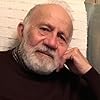Maurice Breslow
In all the reading I'd done over the years, I'd somehow never gotten around to reading any of Arthur Conan Doyle's Sherlock Holmes stories. Sure, I'd seen the many Sherlock movies and TV series, but I had never actually gone to the source: Doyle's own writing. But once I started, I really got into it. I read all of Holmes, plus many of Doyle's other works, his memoirs, and a very good biography of him. In the latter book, I learned that in 1893, about midway in his career, Doyle decided to end the Holmes series, which he felt was taking time from what he considered his more serious writing, and also from the care of his consumptive wife. So, he decided to kill off Holmes. It would be done in one last story, titled "The Final Problem." Doyle went though with this, but after years of pressure and pleading from his fans, he brought Holmes back.
Some time later, while thinking about all this, I had a sudden thought: Kill off Holmes? That's murder, a crime! Holmes fights crime. What if he fought this crime? What if he could somehow come out of his world, into Doyle's, and fight against his creator for his very survival? And he would obviously succeed, because, after all, Doyle did bring his great detective back. Why did he? What made Doyle change his mind? What could Holmes do to change Doyle's mind? How do literary characters (also present are Watson and the remarkable Doyle character Irene Adler) confront their author?
Thus, "Full Circle" was born. But not yet as a book. Having spent my life in theatre, I first turned my idea into a play. But about a year and a half ago, I adapted my play into the novella "Full Circle: Sherlock Holmes's Greatest Challenge Ever." It was published last August (2022). I hope those who pick it up will enjoy reading it as much as I enjoyed writing it.
Some time later, while thinking about all this, I had a sudden thought: Kill off Holmes? That's murder, a crime! Holmes fights crime. What if he fought this crime? What if he could somehow come out of his world, into Doyle's, and fight against his creator for his very survival? And he would obviously succeed, because, after all, Doyle did bring his great detective back. Why did he? What made Doyle change his mind? What could Holmes do to change Doyle's mind? How do literary characters (also present are Watson and the remarkable Doyle character Irene Adler) confront their author?
Thus, "Full Circle" was born. But not yet as a book. Having spent my life in theatre, I first turned my idea into a play. But about a year and a half ago, I adapted my play into the novella "Full Circle: Sherlock Holmes's Greatest Challenge Ever." It was published last August (2022). I hope those who pick it up will enjoy reading it as much as I enjoyed writing it.
More Answered Questions
About Goodreads Q&A
Ask and answer questions about books!
You can pose questions to the Goodreads community with Reader Q&A, or ask your favorite author a question with Ask the Author.
See Featured Authors Answering Questions
Learn more


